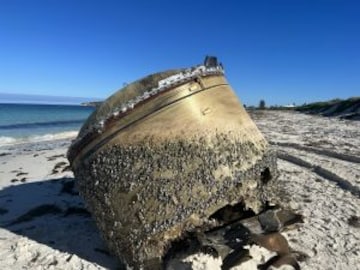
On March 8, a mysterious object crashed through the roof of Alejandro Otero's home in Florida. Today, NASA admitted that it was a 700 gram metal object that was discarded by the International Space Station in March 2021.
It's common practice to dispose of junk in space and they are supposed to burn up when it enters the Earth's atmosphere but this one didn't. Many
The metal object that fell from the sky and crashed into Otero's home was part of a pallet, a flat wooden structure, which was used to store aging batteries that weighed over 2,630 kg.
The problem of rising space debris
More than 25,000 objects larger than 10 centimetres are floating around the Earth's orbit and this junk travels at a tremendous speed of about 7 to 8 kilometres a second, according to NASA.
Some of them travel at ten times the speed of a bullet.
An average of one cataloged piece of debris fell back to Earth each day in the last 50 years, the American space agency said.
On April 2, a flaming piece of orbital wreck weighing over 1,500 kg, which was left in space by the Shenzou 15 mission launched by China, crashed over Southern California.
A space debris from the Indian Space Research Organisation's (ISRO) PSLV satellite fell on a beach in Australia in 2023.

Most of the space debris falls into the oceans, covering over 70% of the Earth's surface.
While the odds may be low, but a big piece of space junk falling at great speeds and crashing into a ship could cause a lot of damage.
Some of the pieces may even be radioactive as was the case with the remnants of the Kosmos 954, a Soviet Union satellite that crashed in the north of Canada in 1978 .
Even those that fall into the water may hurt life and pollute marine ecosystems.
Possible accidents on Earth due to falling space debris are not the only risks.
The floating space junk also collide with satellites in outer space. By NASA's admission, the ISS collides with space debris at an average of once a year.
There are international laws to curb the generation and management of space junk. Article 7 of the Outer Space Treaty says that the country launching the space object would be liable to pay for any damages due to the debris it leaves behind.
The convention, which came into force in September 1972, also provides for procedures for the settlement of claims for damages, says the United Nations Office of Outer Space Affairs.
However, the junk and the risks emerging from it are increasing with the rising role of private players in the space industry.
The first fine for leaving discarded junk in space was imposed only in October 2023. The US-based Dish Network paid $150,000 for violating the norms.
The European Space Agency has a planned launch in 2026 to clean up millions of space debris. The Switzerland-based Startup Clearspace that built the solution described the vehicle as a tow truck for the space.
A defunct rocket weighing 112 kg is only one of the millions of junk floating over our head in the low Earth orbit waiting to be cleaned up by Clearsapce, which was described byTIME Magazine rated as one the best inventions of 2023.
It's common practice to dispose of junk in space and they are supposed to burn up when it enters the Earth's atmosphere but this one didn't. Many
The metal object that fell from the sky and crashed into Otero's home was part of a pallet, a flat wooden structure, which was used to store aging batteries that weighed over 2,630 kg.
The problem of rising space debris
More than 25,000 objects larger than 10 centimetres are floating around the Earth's orbit and this junk travels at a tremendous speed of about 7 to 8 kilometres a second, according to NASA.
Some of them travel at ten times the speed of a bullet.
An average of one cataloged piece of debris fell back to Earth each day in the last 50 years, the American space agency said.
On April 2, a flaming piece of orbital wreck weighing over 1,500 kg, which was left in space by the Shenzou 15 mission launched by China, crashed over Southern California.
A space debris from the Indian Space Research Organisation's (ISRO) PSLV satellite fell on a beach in Australia in 2023.

Most of the space debris falls into the oceans, covering over 70% of the Earth's surface.
While the odds may be low, but a big piece of space junk falling at great speeds and crashing into a ship could cause a lot of damage.
Some of the pieces may even be radioactive as was the case with the remnants of the Kosmos 954, a Soviet Union satellite that crashed in the north of Canada in 1978 .
Even those that fall into the water may hurt life and pollute marine ecosystems.
Possible accidents on Earth due to falling space debris are not the only risks.
The floating space junk also collide with satellites in outer space. By NASA's admission, the ISS collides with space debris at an average of once a year.
There are international laws to curb the generation and management of space junk. Article 7 of the Outer Space Treaty says that the country launching the space object would be liable to pay for any damages due to the debris it leaves behind.
The convention, which came into force in September 1972, also provides for procedures for the settlement of claims for damages, says the United Nations Office of Outer Space Affairs.
However, the junk and the risks emerging from it are increasing with the rising role of private players in the space industry.
The first fine for leaving discarded junk in space was imposed only in October 2023. The US-based Dish Network paid $150,000 for violating the norms.
The European Space Agency has a planned launch in 2026 to clean up millions of space debris. The Switzerland-based Startup Clearspace that built the solution described the vehicle as a tow truck for the space.
A defunct rocket weighing 112 kg is only one of the millions of junk floating over our head in the low Earth orbit waiting to be cleaned up by Clearsapce, which was described byTIME Magazine rated as one the best inventions of 2023.
First Published: Apr 16, 2024 10:40 AM IST
Check out our in-depth Market Coverage, Business News & get real-time Stock Market Updates on CNBC-TV18. Also, Watch our channels CNBC-TV18, CNBC Awaaz and CNBC Bajar Live on-the-go!
